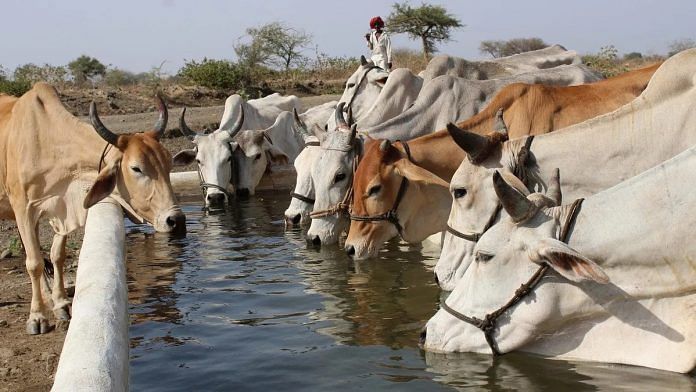New Delhi: Potential for increasing farmers’ incomes lies primarily in moving towards animal husbandry and pisciculture, finds a study led by prominent agricultural economist Ashok Gulati and three other researchers.
Titled “New Deal for Agriculture for Viksit Bharat@2047”, the study, which was published by the Indian Council for Research on International Economic Relations (ICRIER) earlier this month, recommends five policy options that could benefit farmers “without placing any undue costs on the rest of the economy.”
The paper authored by Gulati, Ranjana Roy, Ritika Juneja and Manish Kumar Prasad of the ICRIER, recommends “diversification away from crops towards high-value commodities” like the livestock sector and fisheries, which have seen drastic growth over the past few years.
The study finds that the contribution of the livestock sector to the total income of agricultural households has increased to 16 percent in 2018-19 from 4 percent in 2002-03.
“The introduction of institutional innovations, such as contract farming and vertical integration of farm operations, have helped the poultry industry become one of the fastest-growing sectors in India,” notes the paper.
Meanwhile, the fisheries sector accounted for 15.2 percent of the country’s agricultural exports in 2022-23.
“Innovative production techniques, such as under controlled environment in polyhouses equipped with fertigation can augment productivity and incomes of farmers, while saving on water and fertilizers. These findings suggest that the potential for increasing farmers’ incomes lies primarily in animal husbandry and pisciculture,” highlights the study.
According to the authors, the demand in these sectors is expected to strengthen in the future as the income of consumers increases and dietary preferences diversify.
They recommend encouraging the private sector to build “efficient value chains” through a “cluster-based approach”, which can be a good investment strategy.
Also Read: ‘Yams over grenades’ in Assam. Samir Bordoloi & his green commandos make farming cool again
Improved market access
The paper further recommends improved “market access” for farmers through four ways for better returns, especially for small producers.
The first way suggested by the authors is “contract farming”, where a direct link between the market and primary producers is a predetermined contract.
“They assure pre-determined market demand, thereby mitigating price and production risks and uncertainties in the market, helping smallholders navigate imperfections of markets and their own asset limitations,” says the study.
Such arrangements are already in place in parts of the country for some specific crops. “Studies have also found that farmers’ returns have been higher in contract farming,” it adds.
The second way is Farmers’ Producers Organisations (FPOs), where market access for FPO members is increased due to improved “bargaining power, enhancing their productivity, increasing incomes, and ultimately mitigating rural poverty.”
According to the authors, the government needs to put in more effort to bring more farmers under such organisations to increase their bargaining power, which will result in better returns and augment their incomes.
The government has already introduced a central sector scheme to establish 10,000 new FPOs by 2027-28.
To emphasise their point, the authors look at data from 2018-19 and state that: “It was estimated that the monthly income of member farmers from cultivation was Rs 4,808 against Rs 2,978 earned by non-members in 2018-19.”
The third initiative suggested is the Open Network for Digital Commerce (ONDC) in agriculture.
It aims to establish open networks for e-commerce in goods and services, “fostering transparency, inclusivity, and innovation,” which in the agriculture sector can bring “transformative changes” by giving farmers direct access to digital marketplaces.
This will also eliminate intermediaries and ensure fairer prices for agricultural produce.
Apart from expanding market reach and profitability, ONDCs can also put small traders, farmers, and sellers on an equal level with larger players. This will promote inclusivity and fair competition while accelerating transactions, and reduce time and resource wastage, notes the paper.
The fourth recommendation is to use the futures market in agriculture. They note that cropping patterns and sowing decisions should adopt a forward-looking approach rather than relying solely on historical data.
The futures market in agriculture needs to be revived with a liberal policy framework so that farmers can be saved from uncertainty, the study adds.
Other recommendations
Other recommendations from the four experts include “liberalising trade policy”, especially on the export side, so that farmers can benefit from access to lucrative foreign markets.
The authors argue against bans on the export of wheat and rice from time to time and repealing the Essential Commodities Act of 1955.
The study further recommends incentivising the workforce to move away from agriculture, considering 45.8 percent of the working population lives on only 18 percent of the GDP. These incentives should come from the government’s end, it adds.
Furthermore, the authors suggest “augmenting total factor productivity in agriculture,” which is a holistic measure of a sector’s growth, defined as the share of output increase with the same amount of inputs, such as fertilisers, land, labour, capital, or material resources employed in production.
(Edited by Richa Mishra)
Also Read: India’s MSP system for farmers has outlived its purpose. It’s time to phase it out



